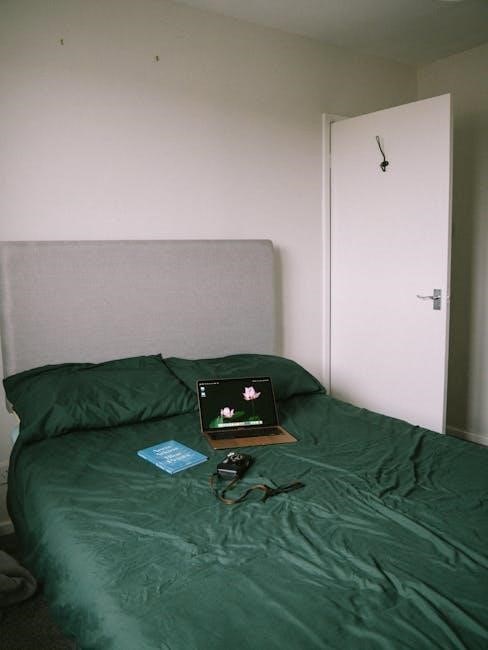Welcome to the Household Habits Study Guide, your roadmap to creating a more organized, productive, and fulfilling home environment. Discover how consistent routines and mindful practices can transform your daily life, improve mental well-being, and foster a sense of accomplishment. This guide offers practical strategies, tips, and insights to help you build and maintain habits that enhance your household’s functionality and harmony. Whether you’re starting fresh or refining existing routines, this comprehensive resource will empower you to cultivate a home that reflects your values and supports your goals. Let’s embark on this journey together to make household habits a cornerstone of your success.

Defining Household Habits
Household habits refer to the consistent practices and routines that shape the functionality and harmony of a home. These habits encompass a wide range of activities, from daily cleaning and meal preparation to broader patterns of organization and maintenance. Unlike one-time tasks, household habits are repetitive and often become automatic over time, influencing the overall atmosphere of a home. They can be intentional, such as setting aside time for laundry, or unintentional, like cluttering spaces out of convenience. Effective household habits create efficiency, reduce stress, and promote a sense of order. By understanding and refining these habits, families can foster a more sustainable, organized, and enjoyable living environment. This section explores the essence of household habits and their role in building a balanced home life.

Daily Habits
Daily habits consist of consistent routines that maintain a household’s efficiency and order. They involve essential tasks performed regularly to ensure smooth home operations and overall comfort.
Morning Routines
Morning routines are essential for setting a positive tone for the day. They often begin with waking up at a consistent time, followed by simple tasks like making beds, quick pick-ups, and breakfast preparation. Personal grooming, such as brushing teeth and washing faces, is also a key component. These small habits help create a sense of control and readiness. Incorporating mindfulness, like a brief meditation or planning the day, can enhance mental clarity. Morning routines also involve preparing lunches or gathering necessary items for the day. Consistency in these activities ensures smooth transitions and reduces chaos, fostering a productive and organized household environment.
Cleaning Tasks
Cleaning tasks are vital for maintaining a hygienic and comfortable living environment. Daily habits include quick pick-ups, wiping down surfaces, and vacuuming high-traffic areas. Weekly tasks often involve deeper cleaning, such as dusting, mopping floors, and sanitizing bathrooms and kitchens. Establishing a cleaning schedule ensures consistency and prevents clutter from building up. Breaking down larger tasks into smaller, manageable steps makes them less overwhelming. Incorporating eco-friendly products can also promote sustainability. Teaching all household members to contribute fosters a sense of responsibility and teamwork. Regular cleaning not only improves aesthetics but also enhances health and mental well-being by reducing stress and creating a sense of order. Consistent cleaning habits lead to long-term benefits for the entire household.
Meal Preparation
Meal preparation is a cornerstone of household habits, ensuring nourishment and efficiency. Planning meals for the week ahead saves time and reduces food waste. Creating a grocery list based on planned recipes helps avoid unnecessary purchases. Prepping ingredients or cooking meals in advance streamlines busy days. Simple habits like setting a cooking schedule or using batch cooking can make mealtime less stressful. Teaching household members to assist with meal prep fosters teamwork and culinary skills. Organizing kitchen tools and ingredients also enhances productivity. Consistent meal preparation habits promote healthier eating, cost savings, and a sense of accomplishment. This routine becomes a vital part of a well-run household.
Weekly Habits
Weekly habits are essential for maintaining order and stability. They include tasks like scheduling, organizing, and assigning responsibilities. Consistency fosters a balanced home environment and reduces stress.
Laundry and Ironing
Laundry and ironing are vital weekly tasks that ensure cleanliness and organization. Sorting clothes by color and fabric type helps prevent damage. Washing, drying, and folding should be done promptly to avoid wrinkles. Ironing is best tackled in batches, using steam for stubborn creases. Designate a specific day each week for these tasks to maintain consistency. Pre-treating stains and using eco-friendly detergents can enhance results. Folding or hanging clothes immediately after drying prevents wrinkles. Regularly cleaning the washing machine and dryer improves efficiency. Staying on top of laundry reduces clutter and keeps your household running smoothly. Incorporate these habits into your routine for a fresher, more organized home environment.
Deep Cleaning
Deep cleaning is a weekly habit that focuses on thorough sanitization and organization of specific areas. It involves tasks like scrubbing bathrooms, cleaning ovens, and dusting hard-to-reach spaces. Pay attention to high-traffic zones, such as entryways and hallways, to reduce dirt buildup. Rotate mattresses and vacuum upholstered furniture to maintain hygiene. Deep cleaning also includes organizing cluttered closets and decluttering shelves. Use eco-friendly products to minimize chemical exposure. Breaking these tasks into smaller steps prevents overwhelm. Create a checklist to track progress and ensure consistency. Regular deep cleaning not only improves aesthetics but also reduces allergens and creates a healthier living environment. Incorporate this habit to maintain a clean and comfortable home.

Outdoor Maintenance
Outdoor maintenance is essential for preserving the beauty and functionality of your home’s exterior. Regular tasks include mowing the lawn, trimming bushes, and watering plants to keep the yard tidy. Seasonal activities, such as raking leaves or shoveling snow, ensure safety and prevent damage. Cleaning outdoor furniture and grills helps maintain their condition for year-round use. Consistent care enhances curb appeal and prevents costly repairs by addressing issues early. Tools like lawn mowers, trimmers, and sprinkler systems simplify these tasks, making outdoor maintenance efficient and manageable. By dedicating time to these habits, you create a welcoming and safe outdoor space that complements your home’s interior.

Monthly Habits
Monthly habits focus on decluttering, organizing, and financial reviews. They also include seasonal preparations to maintain efficiency and readiness throughout the year.
Decluttering and Organization
Monthly decluttering and organization are essential for maintaining a tidy and functional home. Start by reviewing each room to identify unnecessary items, sorting them into categories like donate, recycle, or discard. Focus on high-traffic areas and storage spaces, such as closets or cupboards, to ensure everything has a designated place. Implementing organizational systems, like labels or dividers, can help keep belongings accessible and orderly. Regular decluttering prevents clutter buildup and reduces stress, while organization improves efficiency and saves time. Consistency is key, so schedule these tasks to maintain a balanced and serene living environment.
Financial Reviews
Monthly financial reviews are crucial for maintaining household stability and security. Review income, expenses, and savings to ensure alignment with budget goals. Track spending patterns to identify unnecessary costs and adjust allocations as needed. Check credit card statements, bills, and bank accounts for accuracy and potential discrepancies. Evaluate emergency funds to ensure they are adequately funded. Assess debt repayment progress and consider strategies to minimize interest or accelerate payments. Regular financial reviews promote transparency, accountability, and informed decision-making, helping households achieve long-term financial health and peace of mind. Use budgeting tools or apps to streamline the process and stay organized.
Seasonal Preparations

Seasonal preparations are essential for maintaining a household’s readiness and efficiency throughout the year. Each season brings unique tasks to ensure comfort, safety, and aesthetics. In spring, focus on cleaning, gardening, and organizing outdoor spaces. Summer calls for preparing cooling systems, patio maintenance, and insect control. Autumn involves insulating pipes, cleaning gutters, and storing summer items. Winter requires organizing holiday decorations, preparing heating systems, and stockpiling supplies. Regular seasonal tasks help households adapt to changing needs, reduce unexpected expenses, and enhance overall quality of life. Create a checklist for each season to stay organized and ensure nothing is overlooked. This practice fosters preparedness and harmony with nature’s cycles.

Benefits of Establishing Household Habits
Establishing household habits fosters a structured environment, enhancing productivity, mental well-being, and financial stability while promoting environmental sustainability and a sense of accomplishment.
Productivity
Establishing household habits significantly enhances productivity by creating a structured routine. Consistent practices, such as morning routines or task prioritization, ensure efficiency in managing daily responsibilities. These habits reduce time spent on decision-making, allowing individuals to focus on important tasks. For instance, meal prepping saves hours during the week, while organized cleaning schedules prevent clutter buildup; Productivity also improves through better time allocation, as habits help individuals avoid procrastination. A well-organized home further boosts efficiency, making it easier to locate items and complete tasks swiftly. Over time, these habits become second nature, leading to a smoother, more productive lifestyle. This consistency fosters a sense of accomplishment and reduces stress.
Mental Health
Household habits play a crucial role in maintaining mental health by fostering structure and stability. Consistent routines reduce stress and anxiety, as they create a sense of predictability and control. A tidy and organized living space contributes to a calm mind, while regular tasks like meal preparation and cleaning provide a sense of accomplishment. These habits also promote accountability and purpose, which are essential for emotional well-being. By maintaining a balanced routine, individuals can avoid feelings of overwhelm and create a healthy work-life balance. Over time, these practices reduce anxiety and depression by providing a sense of mastery over one’s environment, ultimately improving overall mental health and quality of life.
Financial Savings
Establishing and maintaining household habits can lead to substantial financial savings. Creating a detailed budget and tracking expenses help families identify and cut back on unnecessary spending. Reducing waste through meal planning and smart shopping reduces grocery bills and minimizes food waste. Energy-saving practices, like switching to LED bulbs or adjusting thermostat settings, can significantly lower utility costs. Additionally, regular maintenance of household items, such as appliances and plumbing, can prevent expensive repairs. Implementing these habits not only enhances financial stability but also encourages a more disciplined and frugal lifestyle, benefiting the household in the long run and creating a path towards financial freedom and security.
Environmental Impact
Adopting environmentally conscious household habits can significantly reduce your ecological footprint. Simple practices like recycling, composting, and reducing waste help conserve natural resources and lower greenhouse gas emissions. Energy-efficient appliances and mindful energy use, such as turning off lights or using LED bulbs, can decrease utility consumption. Conserving water through fixes like low-flow fixtures or fixing leaks also supports environmental sustainability. Reducing reliance on single-use plastics and choosing eco-friendly cleaning products further minimizes pollution. These small, consistent efforts collectively contribute to a healthier planet, promoting biodiversity and combating climate change. By prioritizing environmentally friendly habits, households can play a vital role in preserving the Earth for future generations while inspiring others to embrace sustainable living.
Creating a Household Study Guide
A household study guide helps families establish routines, track progress, and celebrate milestones. It serves as a roadmap for transforming habits into lasting, impactful lifestyles.
Setting Goals
Setting clear and achievable goals is the foundation of a household study guide. Start by identifying specific habits or routines you want to adopt or improve. Break down larger objectives into smaller, manageable tasks to ensure progress. Prioritize tasks based on importance and urgency, and assign timelines for completion. Make sure goals are SMART—specific, measurable, achievable, relevant, and time-bound. Involve all household members in the goal-setting process to foster accountability and teamwork. Regularly review and adjust goals to reflect changing needs and circumstances. A well-defined set of goals ensures focus and direction, making it easier to track progress and celebrate success.
Overcoming Obstacles
Overcoming obstacles is crucial for maintaining household habits. Common challenges include procrastination, lack of motivation, and unexpected interruptions. To address these, identify the root cause of the issue and create strategies to mitigate it. For instance, break tasks into smaller, manageable steps to avoid feeling overwhelmed. Establish a consistent routine to combat procrastination and allocate time for unexpected disruptions. Use visual reminders or alarms to stay on track. Celebrate small victories to maintain motivation and adapt habits as needed. Flexibility is key to sustaining long-term success. By addressing obstacles proactively, households can build resilience and ensure habits remain effective over time.
Tracking Progress
Tracking progress is essential for maintaining household habits. Use tools like checklists, journals, or apps to monitor tasks and stay accountable. Regularly reviewing accomplishments helps identify patterns and areas for improvement. Celebrate completed tasks to stay motivated and adjust routines as needed. Setting milestones allows for clear measurement of progress, ensuring habits remain consistent. Open communication among household members fosters teamwork and shared responsibility; By consistently tracking progress, households can identify what works and make necessary adjustments to maintain long-term success. This practice ensures habits evolve with changing needs, keeping the household efficient and organized over time.
Celebrating Milestones
Celebrating milestones is a powerful way to reinforce household habits and maintain motivation. Recognize achievements, no matter how small, to create a sense of accomplishment. Small rewards, like a family dinner or movie night, can incentivize continued effort. Acknowledge individual contributions to foster teamwork and pride in shared goals. Reflecting on progress during celebrations helps identify what’s working and what needs adjustment. Marking milestones also builds resilience, encouraging persistence through challenges. By celebrating successes, households strengthen their commitment to maintaining habits, turning them into lasting routines that benefit everyone. This positive reinforcement creates a culture of accountability and joy in achieving collective goals.

Maintaining Household Habits
Maintaining household habits requires consistency, positive reinforcement, and teamwork. Adaptability is key, as life changes demand flexible routines. Regular reflection helps refine habits for long-term success.
Building Routines
Building routines is the cornerstone of maintaining household habits. Start by identifying key tasks and assigning specific times for them. Consistency is crucial, as it helps create a sense of structure. Involve all household members to ensure shared responsibility and accountability. Break tasks into smaller, manageable steps to avoid overwhelm. Use visual reminders like calendars or charts to track progress. Positive reinforcement, such as praise or small rewards, can motivate everyone to stick to the routine. Over time, these practices become second nature, simplifying daily life and fostering a sense of accomplishment.
- Set clear, achievable goals for each routine.
- Encourage teamwork to distribute responsibilities fairly.
- Be patient and allow time for habits to form.
Staying Motivated
Staying motivated is essential for maintaining household habits. Celebrate small victories to keep morale high, as recognizing progress boosts encouragement. Set realistic expectations and reward yourself or family members for consistency. Sharing goals with others increases accountability and provides emotional support. Reminders of the long-term benefits, such as a cleaner home or financial savings, help maintain drive. Incorporate fun elements, like music or group activities, to make tasks enjoyable. Lastly, practice self-compassion during setbacks, as perseverance is key to sustaining habits over time.
- Celebrate progress, no matter how small.
- Share goals with others for accountability.
- Focus on the long-term benefits of your efforts.
Being Flexible
Being flexible is crucial for maintaining household habits, as life’s unpredictability often requires adjustments. Rigidity can lead to frustration, while adaptability ensures habits endure despite changes. Embrace the idea that routines can evolve, and prioritize tasks based on current needs. For example, swap a scheduled cleaning task for an unexpected errand without guilt. Allow for spontaneity, like taking a break from meal prep for a family outing. Flexibility also means delegating tasks when necessary or adjusting timelines to accommodate surprises. By staying open to change, you create a balanced and sustainable approach to household management that fosters resilience and harmony.
- Adapt routines to life’s unexpected changes.
- Prioritize tasks based on current needs.
- Allow for spontaneity and delegate when needed.

Incorporating Technology and Tools
Smart home devices, habit-tracking apps, and online resources streamline household management, enhancing efficiency and consistency in maintaining routines and goals.
Apps for Habit Tracking
Habit-tracking apps are essential tools for maintaining household routines. Apps like Habitica and Tody allow users to set reminders, track progress, and create customizable schedules. These platforms help individuals stay consistent with daily tasks, such as morning routines or meal preparation. By gamifying chores, apps like Habitica make household management engaging and rewarding. Tody simplifies task delegation among family members, ensuring everyone contributes. Additionally, apps provide insights into completed tasks, helping users identify patterns and areas for improvement. Regular use fosters accountability and long-term adherence to household habits, making these tools indispensable for a well-organized home.
Smart Home Devices
Smart home devices significantly enhance household habit management by automating routines and providing convenience. Devices like smart thermostats and lights can be programmed to follow daily schedules, reducing manual effort. Voice assistants, such as Alexa or Google Home, enable hands-free control of chores and reminders. Smart plugs and security systems further streamline tasks, ensuring consistency in maintenance. These tools promote energy efficiency and cost savings. By integrating smart home devices, households can maintain order effortlessly, fostering long-term adherence to routines. They also offer customization options, allowing users to tailor settings to their unique needs. This technology supports a stress-free and organized living environment, making household habits easier to sustain.
Online Resources
Online resources are invaluable for establishing and maintaining household habits. Websites, apps, and platforms offer tutorials, templates, and guides to help create structured routines. Budgeting apps like Mint or YNAB assist with financial planning, while meal planning tools like Plan to Eat streamline grocery shopping and cooking. Cleaning guides on Pinterest or YouTube provide step-by-step instructions for organizing and decluttering. Additionally, e-books, webinars, and online courses on platforms like Udemy or Coursera teach effective habit formation. Forums and communities, such as Reddit’s r/homemaking, allow users to share tips and experiences. These resources empower individuals to customize and stick to their household routines, improving productivity and reducing stress. They are accessible, affordable, and tailored to diverse needs.

Case Studies and Examples
Real-life examples highlight the effectiveness of household habits. For instance, a family of four implemented a morning routine that reduced chaos by 30%, ensuring everyone left on time. Another case involved a couple who streamlined their cleaning schedule, cutting weekly chores from 8 to 4 hours. A single parent adopted a meal prep habit, saving $200 monthly on takeout. These examples demonstrate how tailored habits improve efficiency and reduce stress. They also show the importance of adapting routines to individual needs. By studying these cases, households can gain inspiration and practical insights to create systems that work for them; These stories emphasize consistency and flexibility as key factors in maintaining successful habits.
Establishing household habits is a powerful way to create a balanced and efficient home environment. By implementing daily, weekly, and monthly routines, families can reduce stress, save time, and improve overall well-being. Consistency is key, but flexibility ensures that habits evolve with changing needs. Tools like apps and smart devices can enhance adherence, while celebrating milestones motivates continued effort. The benefits extend beyond productivity, positively impacting mental health, finances, and the environment. Developing household habits fosters a sense of control and harmony, making it easier to navigate life’s challenges. Start small, stay committed, and watch how these practices transform your home and daily life for the better.
